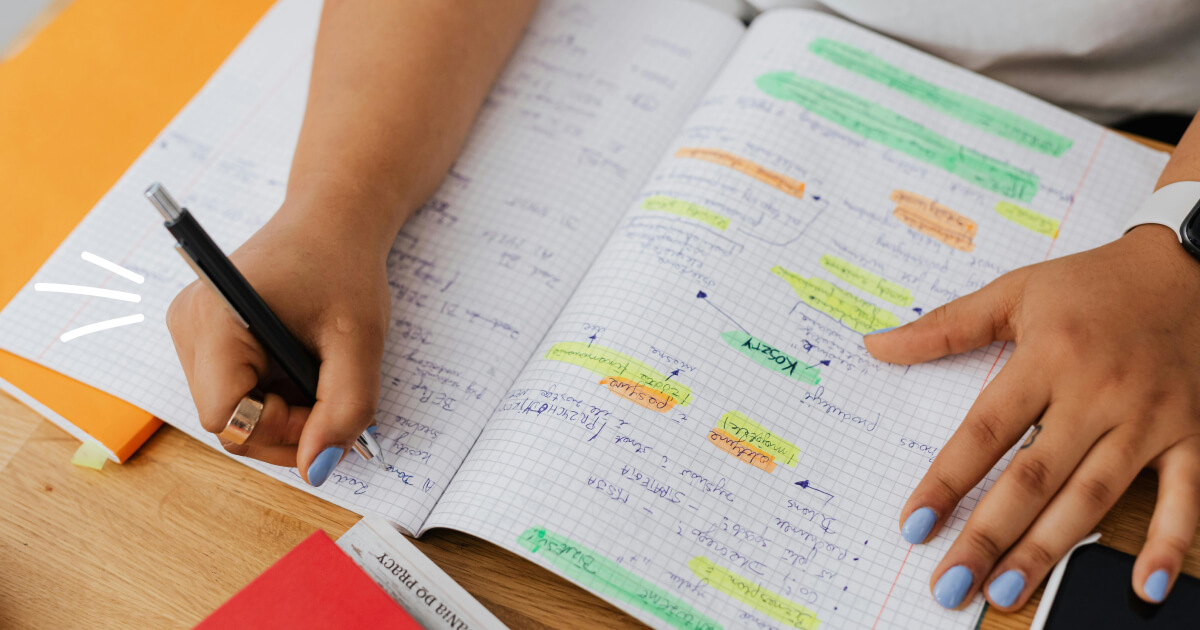Ah, the dreaded GCSEs!
I’m sure many of us reading this remember the feeling of impending doom as GCSE exam season approached…
Spending hours holed up in our rooms with textbooks and notes scattered everywhere, trying to cram as much information into our brains as possible.

But here’s the thing: GCSEs are important.
They are the first formal qualifications that most of us will receive, and they can open doors to further education and career opportunities.
So, while the process of preparing for GCSEs may seem like a never-ending slog, it's worth putting in the effort to do well!
In this article, we'll take a closer look at why GCSEs are so important, and we'll share some tips and tricks for how to prepare for them.
Whether you're a student who's knee-deep in revision or a parent who wants to support your child through this challenging time, we've got you covered. So, put down the highlighter and take a deep breath - you’ve got this!
What are GCSEs?
GCSEs (General Certificate of Secondary Education) are a set of exams taken by students in the UK typically at the age of 16.
They are used to assess students' knowledge and skills in a range of subjects and are an important factor in determining eligibility for further education and employment opportunities.
Depending on the subject studied, GCSEs can be made up of a written (for example, English), independent coursework completed throughout the year (often seen in Business Studies) or a practical assessment (such as the PE exam).
Why are GCSEs important?
GCSEs are taken at a crucial stage of education for students in the UK, marking the end of their secondary school education and providing a foundation for their future academic and professional aspirations.
These exams are important because they serve as a benchmark for universities, colleges, and employers to assess a student's knowledge, skills, and abilities.
GCSE grades are also a key factor in determining a student's eligibility for further education, including A-levels, vocational courses, and apprenticeships.
Students who perform well in their GCSEs open up more opportunities for their future, while those who perform poorly may be limited in their options.
For parents, GCSEs serve as a reflection of their child's academic progress and potential. Although they are by no means the only thing that demonstrates a student’s abilities, they are a helpful factor.
By achieving good grades, students demonstrate their dedication and ability to succeed, which can set them up for success in the future, whether that is in a job role or in their personal life.
It is essential that students and parents take GCSEs seriously and prioritise preparation, revision, and support to ensure the best possible outcomes.
When do GCSEs take place?
All GCSE exams take place throughout May and June. The exam timetable for 2023 is now officially published so students can access this and start planning now.
The pressures of GCSEs
“Under pressure, pushing down on me…”
There are several pressures associated with GCSEs that can make them a source of stress for students.
- Firstly, the exams are high stakes, meaning that they can significantly impact a student's future academic and professional prospects. Students are often under pressure to perform well and achieve good grades, as their GCSE results can determine their eligibility for certain courses or careers.
- Additionally, the sheer volume of content to be covered in GCSE subjects can be overwhelming, leading to stress and anxiety. These subjects are taught over a 2-3 year period at school, meaning the knowledge bank can build up quickly.
- The format of these exams also doesn’t suit all types of learners. There tends to be a lot of writing and long form assessments, particularly for core subjects. If this is not a strong point then this can cause stress for many learners.
- Furthermore, the pressure to balance revision with other commitments such as extra-curricular activities or part-time jobs can add to the stress.
- Finally, the external factors such as expectations from parents, teachers, and peers, can also contribute to stress and anxiety for students.
These pressures can make GCSEs a daunting and stressful experience for many students. As a result, it is important for students to find healthy coping strategies, such as exercise, relaxation techniques, and seek support from teachers and family members to manage stress and perform to the best of their ability.
Tips for revision
So, you hopefully have a better understanding now of just how important GCSE exams are in a student’s education journey. Let’s dive into some of our top tips for revision.
1. Start early
Students have heard it before from teachers, parents and tutors - get ahead early!
Starting early with GCSE revision is essential for students who want to succeed. Ideally, students should start preparing for GCSEs in Year 9 (ages 13-14), which gives ample time to cover the content and develop strong study habits.
The main reason for starting early is that the GCSE syllabus is extensive, and there is a lot of material to cover in each subject.
By starting early, students can break the content down into manageable chunks and revise it thoroughly over a longer period. This can help them build a stronger foundation of knowledge, which they can then build on as they progress through their studies.
Additionally, starting early allows students to identify and address any knowledge gaps or weaknesses early on, rather than trying to cram at the last minute.

Some other benefits that come from starting early are:
- It can reduce stress and anxiety, as students have more time to prepare and feel more confident in their abilities.
- It can lead to better grades, as students have a better understanding of the content and are more familiar with the exam format.
- It can also help students develop good study habits, such as time management and organisation skills, which are essential for success in further education and in the workplace.
So, for all of you who have to nag your children to get on with their work and submit work before the deadline, keep at it. They will thank you one day!
2. Plan, plan, plan
“Fail to plan, plan to fail”
Planning ahead and creating a revision schedule is a crucial aspect of any exam preparation, so it most definitely applies to GCSEs.
Here are just some of the ways creating a revision schedule will benefit a student:
- Time management: a schedule ensures that they cover all the necessary content in time, and learning to manage their time is a skill they will need for the rest of their lives.

- It can help students break down the syllabus into manageable chunks and allocate sufficient time to each subject. This can also help them identify any areas that require more attention or revision.
- It ensures that they have a structured and organised approach to their revision, which can help reduce stress and increase productivity.
- It also allows them to monitor their progress and make adjustments as needed.
- All of this can also help students balance revision with other commitments such as extracurricular activities and part-time jobs.
Overall, planning ahead and creating a revision schedule is a crucial aspect of GCSE preparation that can lead to better grades, reduced stress, and improved time management skills.
3. Focus
It is better to spend more time focused on one thing than spend all your time switching between different topics.
This ensures that you cover all necessary content and develop a deep understanding of each topic. When you focus on one topic, you can dedicate your full attention to it, without distractions, and engage in active learning, which helps to reinforce your knowledge.
If you are having trouble focusing on tasks, try using a productivity timer to motivate yourself. This chrome extension called Rofocus can help you time your work sessions and it offers some calm focus music for the background too.
It also allows you to break down the content into manageable chunks, making it easier to digest and remember.
Similarly, dedicating specific revision slots to each subject can help you to cover all bases, without feeling overwhelmed. By allocating a specific amount of time to each subject, you can ensure that you give each subject the attention it deserves and can make progress in each one.
Additionally, it allows you to monitor your progress and identify areas that require further attention. Focusing on one topic at a time and dedicating specific revision slots to each subject can also help students to manage their time effectively and develop good time management skills, which are essential for success in further education and in the workplace.
Overall, this approach to revision can lead to better grades, increased productivity, and reduced stress, making it a valuable strategy for GCSE preparation.
4. Rest
Just as taking a rest day from sport benefits your muscles and your body, so does taking a rest from studying.
Now, we don’t mean taking 4 hour Netflix breaks in between 10 minutes of studying (sorry!). What we actually mean is taking 5 minute breaks in between 25 minutes of studying.
Your brain is a muscle too, so it needs rest and recovery.

When anyone revises for long periods without taking breaks, they can experience burnout, which can negatively affect their productivity and mental health.
Rest and taking regular breaks can help students recharge and avoid burnout. This allows them to return to their studies with renewed energy, motivation and focus.
Additionally, taking breaks can improve memory retention, as the brain consolidates information during periods of rest.
It also means it’s easier to maintain a healthy work-life balance, which is essential for physical and mental well-being. This, in turn, can increase productivity and reduce stress, leading to better grades and a higher success rate.
Finally, taking breaks allows students to pursue other interests, engage in physical activity, and spend time with family and friends, which are essential for maintaining a positive mindset and reducing anxiety.
In conclusion, rest and taking regular breaks is an important aspect of GCSE preparation that can help students achieve their full potential, maintain good health, and improve their success rate.
How can Learning Cubs help?
The Learning Cubs team is here to provide support for any student undertaking their GCSE exams.
Our team tutors students of all abilities for GCSE exams and have a ton of experience with different subjects and learning styles.

Whether your child is looking for some explanations around a maths topic that is puzzling them, or they need practice reading long texts and interpreting them for the English exams, we can help. Get started with a free baseline assessment and we’ll plan a bespoke learning journey from their!




.png)











